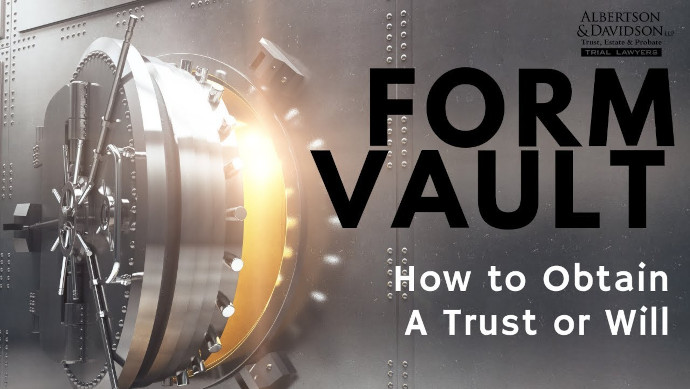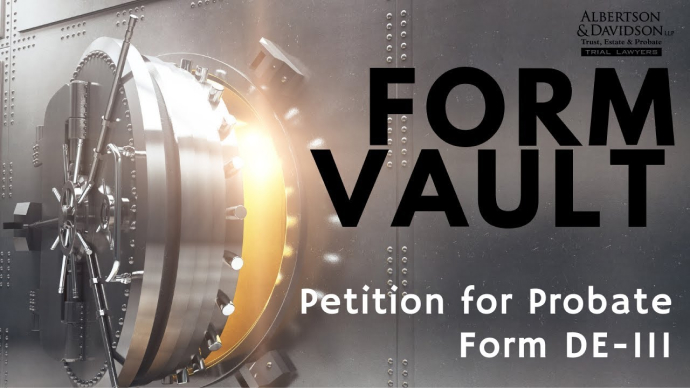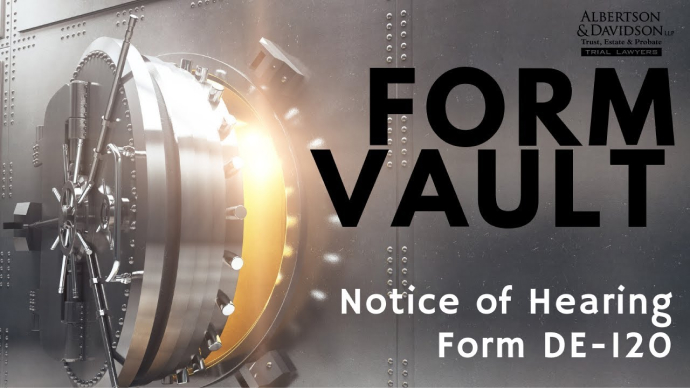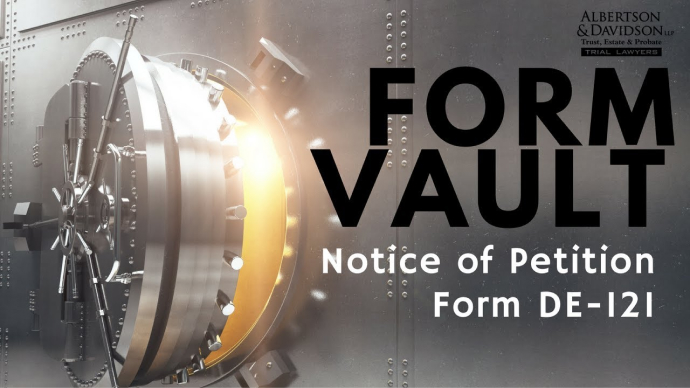Free resources:
Video Transcript
The following is an unedited, verbatim transcript of our video. It is not intended to be a stand-alone article.
Hi, this is Keith Davidson at Albertson & Davidson. In this video, we’re discussing how to obtain a copy of a Trust or a Will. So let’s say one of your parents dies and you’re trying to get a copy of a Trust or Will, but for whatever reason you just can’t seem to obtain a copy of those documents.
The first thing you should know that when it comes to Trusts – Trusts are not recorded with any type of government entity. So they’re not with the County Recorder, they’re typically not with the courts. You’re never going to find a Trust out there in some data bank where you can see it. Trusts or private documents, they’re usually given to the client, the client then has to maintain them. Sometimes the lawyer who drafted the Trust will keep a copy, sometimes they won’t. It depends on the lawyer. So it’s not that easy to get a copy of the Trust if the person who has it won’t hand it over to you. So we’re going to talk about how to get that trust document.
For Wills, they’re also not logged with the county or with the court until somebody dies, and then they’re supposed to be logged with the court but that doesn’t always happen.
Using Appropriate Language in the Request
So let’s take a look, and we’re going to start with a blog post that we did on our website – quite a while ago now. This was done on September 5th, 2014 and in this blog post, we actually have language that you can use, you can actually take this language, pop it into an email or a letter and send it off to the named executor or trustee to try and get a copy of the documents. But let’s start with the Will.
Obtaining a Copy of the Will
So you can see under the first paragraph of this language for obtaining a copy of the Will, it references Probate Code, Section 8200, and it’s saying that you as executor, so you’re sending this to the executor, are required to deliver a copy of the Will to the County Superior Court where mom and dad died within 30 days of mom and dad’s respective deaths. So, let’s take a look at that Code Section that we’re referencing. So the easiest way to find California Code sections is just do a Google search for “California legislative information.” Once you get to the California legislative information page, I’ll just click over to it now, you actually have this here and you can go to the bottom and look at California law and it’ll give you the code sections including the California Probate Code. When we click on California Probate Code, we can go to the section that covers 8200 because we already know that’s the section and that’s the production of the Will. So it says here on 8200a, unless a petition for the probate of the will is earlier filed, the custodian of the will, that means whoever has it, within 35 days after having knowledge of the death of the testator, they must do any of the following including number 1, deliver the Will personally or by registered or certified mail to the clerk of the Superior Court of the county in which the estate of the decedent may be administered, that’s the county where the decedent passed away, where they were residing at the time of their death. You’ll also notice that under “b” a custodian of a will who fails to comply with this requirement shall be liable for all damages sustained by any person injured by that failure. So going back then to our form language, the first paragraph of this says that you’re required to deliver this to the court and please note if I am damaged by your failure to deliver the will to the court, you may be liable for my damages, and we reference Code Section 8200 B.
On the second paragraph, we say since you’re required to deliver it to the court, you should have no objection in providing me with a copy as well. If they refuse to give you a copy but they file it with the court, well that’s easy, you can just go to the court and get a copy from the court, if they refuse to do both, at least now you have it in writing that you made your demand.
Filing With The Court
The next step is going to be filing with the court and asking for a court order, ordering them to hand over the will, but at least, this is the starting point. You need to get this written request out as soon as possible. So you can use this language, put it in an email, a letter, a fax, however it is you communicate and get it over to the named executor or whoever has a copy of the will, and at least then you’ll get the ball rolling. You don’t have to use this specific language by the way, there’s no magic language. As long as you get the point across that I’m an heir of law of mom and dad, and I’m entitled to this will, that’s the message you need to deliver. But you’re welcome to copy this language if you like.
Obtaining a Copy of a Trust
Now let’s talk about obtaining a copy of a Trust. Trust work in a lot of the same ways, except trusts are not typically sent to the County Court the way Wills are. So we’re going to start with Probate Code Section 16060.7, and that says on the request of a beneficiary, the trustee shall provide the terms of the trust to the beneficiary unless the trustee is not required to provide the terms to the trust in accordance with section 16069. Well you can go look at 16069, it specifically says it doesn’t apply if the trust is revocable and it doesn’t apply if the trustee and the beneficiary are the same person. But other than that, it always applies. So you are entitled to a copy of the trust. The trustee is also required to serve a copy of the Trust on heirs at law of the trust settlor, not just trust beneficiaries. So if you’re a child and you want to see your mom or dad’s Trust, and your mom and your dad are deceased, even if you are not a beneficiary of that Trust, you’re still entitled to see a copy of the documents. And you’ll find that under 16061.7 and you come down here to subsection b. And subsection b 2 specifically says that the trustee must serve a copy on each heir of the deceased settlor and each beneficiary of the trust or the irrevocable potion of the trust. So that’s how you know that you’re entitled to a copy.
So here, this is the language that we have used, that you can use as well. And it starts off referencing Probate Code section 16061.7 and it’s telling the trustee that you as trustee of this trust are required to provide all beneficiaries of the trust and all of mom and dad’s heirs with a true copy of the trust documents 60 days after their death, as you are required to provide mom and dad’s trust after 60 days of their death you should have no objection in providing me a copy. So again, we want to get this written notice out to the trustee as soon as possible.
They have 60 days in which to give you the documents after you send written notice, and if they refuse to do so, then you’re free to file your petition with the court and ask the court to order them to give you the documents. So this is another great way where you can just use this language, put it into an email, a letter, a text, however you communicate, and get it over to the trustee. You don’t have to use this specific language if you don’t want to, but this is a good example of language you can use and you’re welcome to copy this language and use it yourself so that you can get a copy of your Trust or Will document.




